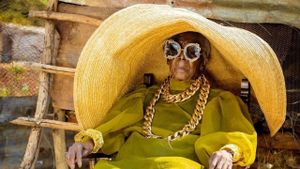The comedy scene in Kenya is experiencing an extraordinary boom as citizens look for laughter amid chaotic times. New venues and innovative comedians are drawing significant audiences, especially from capital Nairobi, where the nightlife thrives with standup performances.
On one swift evening at the Punchline Comedy Club, Kimathi Kaumbutho, affectionately known as KK, entertained patrons with infectious charm. Given the filled outdoor space of Two Grapes, his performance reflected the cool night air filled with chuckles and applause — humor bubbling away at the backdrop of political and social issues troubling the nation.
KK, who effortlessly weaves humor about colonial history, reflected, “I love how white people discover stuff already there. I received this DM from this white guy who’s like, ‘Oh my gosh! I love your content! So glad I discovered you!’ I just wanna say, ‘No, we’ve done this before.’” With sharp wit, he highlighted the perplexities of cultural recognition, riffing on how comedic talents are often only acknowledged when outsiders validate them.
This vibrant scene is fueled not only by the comedians themselves but also by the establishment of several comedy collectives and clubs like Punchline Comedy Club. Launched in 2017 by Eric Lu Savali, Punchline Comedy Club aims to democratize the art of comedy, creating structures to support both budding and seasoned comedians. “I wanted to start where there’s structure,” Savali noted, emphasizing the importance of fairness within the artistic community.
Standup comedy has been part of Kenyan culture for years, manifesting through theater, sketches, and puppet shows. Yet, it gained significant momentum with the launch of shows such as Red Corner and the immensely popular Churchill Show. These platforms have ushered comedians like Anthony “Ty” Ngachira and Eunice Njoki, also known as Mammito, who brings spicy humor to social topics and common experiences.
Notably, the laughter on stage finds resonance within people’s realities, as many Kenyans face challenges like corrupt governance, rising debt, and social inequality. Njoki Ngumi, a Kenyan creative economy expert, aptly stated, “We have to take every opportunity we get to laugh. That is the real gift of standup.” With humor, comedians tackle the intricacies of daily life, poking fun at topics ranging from politics to pop culture.
At the lively Nairobi Laugh Bar, Mammito delighted the audience as she playfully critiqued baby showers, humorously declaring, “They should stop after the first child! You can’t be calling us for baby showers for your seventh kid.” Such performances pave ways for public discussions on often-taboo subjects, reflecting the cultural shifts occurring within the Kenyan society.
Despite the comedic rise, the backdrop of turbulence is palpable. Earlier this year, deadly anti-government protests erupted over tax hikes, prompting many citizens to seek solace and humor as coping mechanisms. Within these tumultuous times, Kenyans are yearning for laughter, embracing comedy as both entertainment and respite from daily pressures.
Among the stars born from this comedic renaissance is Ty Ngachira. After making his debut on stage at the relatively late age of 30, he has effortlessly transitioned from law to laughter, hosting his own show, TMI (Too Much Information) with Ty Ngachira, which airs during prime time on national television. Following his sold-out one-man special, Ngachira expressed pride in finding commercial success, noting, “It was fulfilling to know it’s possible to be commercially viable.”
He fondly remembers the inspiration gleaned from watching American comic Kevin Hart and aims to replicate such relatability and humor, facilitating connections with his audience through storytelling and laughter.
Comedy collectives like Nairobi Comedy Club, Standup Collective, and Karura Comedy Club have emerged, each aiming to fortify the community of comedians through various initiatives and support systems. On any average night, Nairobi's comedy venues may host numerous showcases, workshops, and performances, allowing laughter to flow liberally, as comedians tackle relatable experiences with creativity and strength.
This recent comedic surge attracts attention not only locally but also internationally. The allure caught the eye of famed comedian Dave Chappelle, who, after performing at the Punchline Comedy Club, was accompanied by up-and-coming local comedians like Savali and Mwangi, marking the global recognition of Kenyans’ comedic potential.
By leveraging humor and entertainment, these comics deliver not just laughs but also shed light on pressing matters encumbering the nation. With performances emphasizing social commentary and cultural critique, they urge audiences to reflect and share the laughter – perhaps strengthening social bonds amid turbulent times.
Kenya’s standup scene, though recent, is etched against historical frameworks where humor was always used as satire against power and societal imbalances. By transforming their everyday frustrations and challenges through comedy, artists strive not only to entertain but to inspire change, pushing boundaries and inviting dialogues never before discussed on such platforms.
The emergence of laughter as both art and weapon within these turbulent times highlights the resilience of the Kenyan spirit. The current wave of comedians emerges with laughter at the core of their craft, blowing new life and perspectives around hope amid uncertainties.



